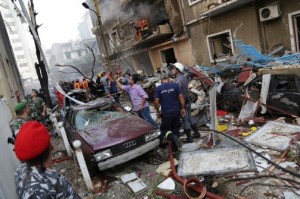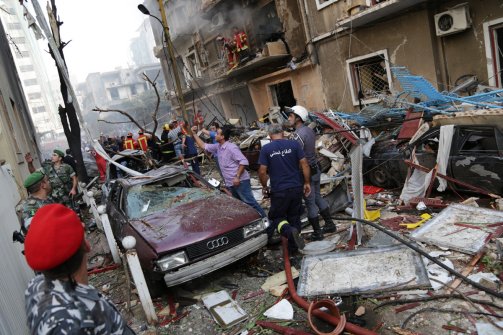
Beirut (AFP) — Damascus has emerged the prime suspect in the assassination of Lebanon’s anti-Syrian police intelligence chief but his death is unlikely to plunge the country into chaos, analysts said on Saturday.
They said the murder of General Wissam al-Hassan in a Beirut car bombing on Friday appeared to show that even in its weakened state Lebanon’s neighbor and former occupier Syria could still take action on the ground.
“Hassan was targeted daily by pro-Syrian newspapers in Lebanon and Damascus accused him of aiding rebels hostile to (President) Bashar al-Assad,” said Ghassan al-Azzi, a politics professor at Beirut’s Lebanese University.
“Damascus detested him above all for catching red-handed with explosives Lebanon’s former information minister Michel Samaha, the most pro-Syrian of Syria’s allies,” he added.
Hassan arrested Samaha at his home in August and police found explosives which investigators alleged were to be used in a series of attacks in northern Lebanon to spark unrest in the country.
A series of deadly sectarian clashes between pro- and anti-Damascus gunmen in the northern city of Tripoli in the summer raised fears that the Syrian conflict was spilling over into Lebanon.
The meticulousness with which Hassan’s assassination was planned and carried out has led to suspicions that his killers were professionals belonging to a state security apparatus.
“It’s a war between the (Lebanese and Syrian) security services,” said Fadia Kiwane, director of political science at Saint Joseph University in Beirut.
“Hassan had spearheaded the confrontation with the Syrian regime since the assassination of prime minister Rafiq Hariri” who was killed in 2005 in a car bombing also blamed on Syria despite its repeated denials.
“The Syrian regime remained in Lebanon for 35 years, it infiltrated all levels of the administration, and is present in all local governments,” she added, referring to Syria’s political and military domination of its neighbor.
The Syrian army withdrew from Lebanon in 2005 after an almost 30-year occupation.
General Ashraf Rifi, head of Lebanon’s Internal Security Forces (ISF), said that Hassan had only arrived back in the country the evening before his assassination.
“No one, not even me, knew when he was getting back from Paris,” he told journalists. “I never asked about his movements for security reasons.”
Hassan was travelling in an unmarked car and his assassins would have had to be well-informed of his plans to wait for him and detonate the car bomb in a narrow street.
According to Azzi, “the Syrians know all the ins and outs of the (Lebanese) state, so there are many suspicions against them, even if we can’t rule out Israel” as responsible for the attack.
“He dismantled several spy rings of the Jewish state and put their agents in prison,” Azzi added.
However, Fabrice Balanche, an expert on Syria, also saw Damascus as suspect number one.
He said Syrian intelligence services “in this way showed their ability to cause a nuisance abroad, particularly in Lebanon. When fighting against an uprising, you have to show you can eliminate your opponents abroad.”
“Assad wants to gain respect by frightening his enemies,” added the director of the Group for Research and Study of the Mediterranean and Middle East, based in Lyon, France.
However, the analysts predicted that Lebanon would not slide into chaos following the attack.
“The country will continue to live under the strain of the Syrian revolution,” Azzi said. “Neither (pro-Syrian) Hezbollah … nor Damascus’s enemies have any desire or interest to plunge the country into civil war.”
Kiwane agreed: “The various Lebanese protagonists are acutely aware of the gravity of the situation and will find a political solution to the assassination since no one wants a new civil war.”

